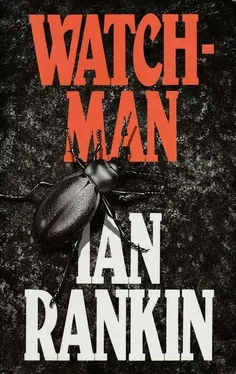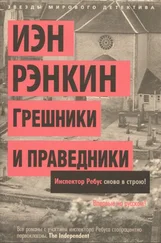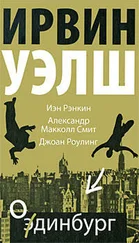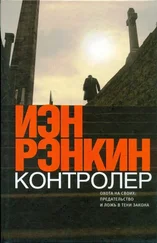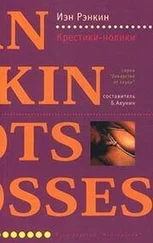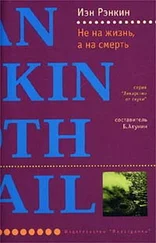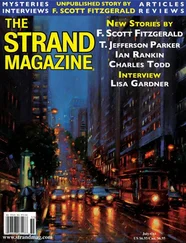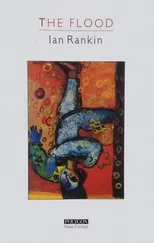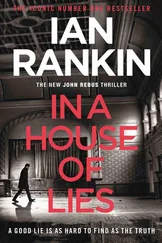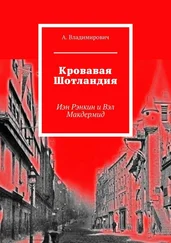From the age of twelve until I was nearly thirty, I kept a page-a-day diary, and reading through the years 1986–88 has allowed me to place Watchman in its historical context. I got the idea for the book just before my wedding day, and took a bunch of research stuff on my honeymoon. The entry for June 14, 1986, records: ‘I’m itching to start a new novel, either Rebu s 2 or The Watcher .’ By July 14 (nine days after the wedding ceremony) I’d decided to concentrate on what was still called Watcher, and I was able to state in my diary that ‘the plot’s beginning to gel.’ I then started writing the first draft a week later, and finished it on Sunday, November 2. (Well, it’s a pretty short book...)
Watchman is a spy novel. My previous novel, Knots & Crosses, had involved a fairly cynical, worldly-wise cop, who’d been in the job the best part of fifteen years. Miles Flint, my hero this time around, happens to be a fairly cynical, worldly-wise spy, who’s spent twenty years or so in that world. (I wish I could explain what attracts me to my jaded elders.) The difference between the two men is that while Rebus is a man of action, preferring confrontation to rumination, Miles starts out just the opposite: he’s a professional voyeur, and my job would be to change his role gradually from one of professional passivity to real ruthless activity.
I think I was influenced largely by the antiheroes of le Carré and Graham Greene, and especially the Greene of The Human Factor . Greene’s best characters tend to be men who are forced to become involved in the world, to take a stand — something they’d much rather not do. The books I took on my honeymoon included nonfiction works on British espionage (by Chapman Pincher and others) and a few on entomology. My partner had paid for me to adopt a dung beetle at London Zoo (it was the cheapest option), and I’d decided that Miles should be an expert on beetles, finding human equivalents for each kind among his colleagues.
Back to the diary... During that first attempt, I had no job. We newlyweds were living in London, and my partner was supporting me while I tried, fresh out of the swaddling that was university, to become a writer. So it was that by January 13, 1987, I’d finished the second draft. Four days later I started work as an ‘assistant’ at the National Folktale Centre in Tottenham (we needed the money). This gave me a lot of free time and access to a word processor, allowing me to write the third draft. By April 1987, I was ensconced at Hawthornden Castle International Retreat for Writers, where fellow scribes included the poets George MacBeth and Ruth Fainlight and the novelist Alasdair Gray. There, between hangovers, I put the finishing touches to the book’s final version. (Another diary entry: ‘Since I found out that Jeffrey Archer writes six drafts of everything, I’ve begun to look more seriously at perfecting my own stories.’)
Watchman was announced in the catalog for Bodley Head (who’d published Knots & Crosses ) in November of that year, and finally appeared on June 9, 1988. My diary for that day reads: ‘ Watchman published; world unmoved.’ A few reviews appeared, some of them positive, and people approached me with a view to doing a spec film script, or maybe to write some episodes of The Bill . It was clear that writing a book a year was not going to keep the wolf from the door, so by this time I’d found a full-time job on a magazine called Hi-Fi Review. Watchman was failing to find a publisher in the USA, while my new editor at Bodley Head was hinting fairly heavily that I’d soon be needing to seek a new UK publisher, too.
I’d finished another novel, Westwind , but no one was buying that either. Things seemed desperate indeed. I had a full-time job that entailed three hours of commuting a day; I was reviewing one or two books a week for Scotland on Sunday newspaper; and somewhere in the margins, I was trying to write. My partner meantime was attempting to move us to France, but she wouldn’t manage that for another eighteen months or so, and before then, I’d have started work on the long-deferred Rebus 2 ...
I changed Watcher to Watchman after discovering Alan Moore’s graphic novel Watchmen . I’m guessing that Miles Flint took his surname from the character in the spoof 1960s spy films In Like Flint and Our Man Flint . Rereading the book recently, I was struck by how fast it moves, cutting quickly from one scene to another, its elliptical, breathless style marking it as a young man’s work, a story by someone in thrall to the possibilities of narrative. Strange, too, that it should be such a period piece: almost no one owns a mobile phone, and Miles doesn’t even own a computer. I was pleased to see so many in-jokes along the way. There’s an oblique reference to the events of Knot s & Crosses , and Jim Stevens, the journalist from that book, reappears. There’s a pub called the Tilting Room (actually a collection of stories by my friend Ron Butlin), and a gay club called the Last Peacock (title of an Allan Massie novel). There’s also a character called the Organ Grinder, whom we’d see again in a later Rebus novel, Th e Black Book .
And Miles’s son is called Jack. I’d forgotten that, though my own son, born four years after the publication of Watchman , has the same name. As to the book’s dedicatee... well, he went on to win a lot of money on Who Wants to Be a Millionaire. Funny old world, innit?
Ian Rankin
Edinburgh, 2003
When i started researching this book, one person whose brain I’d just been picking begged me ‘for God’s sake make it realistic.’ He was fed up with stories that exaggerated the ‘glamour’ of the spy and the ingenuity of his tools of trade. However, the following six months’ worth of conversation and reading left me more than a little confused. It seemed to me that the problem in writing a novel about the security service was that reality was sometimes so much more unbelievable than fiction. I showed part of the first draft of the book to my acquaintance, and he telephoned the same night. ‘How the devil did you know that?’ he demanded, citing one particular passage (extant). ‘I made it up,’ I replied quite truthfully. ‘Oh no, you didn’t...’ he began, and then fell silent, having said too much already...
Some of Watchman was written while enjoying the hospitality of Hawthornden Castle International Retreat for Writers, and my grateful thanks go to the staff there.
I should also add that, really, MI5’s surveillance section is known as the Watcher Service. But I find the terms ‘watchman’ and ‘watchmen’ more resonant, as fans of Alan Moore will doubtless agree.
I.R.
It was said that his ancestors had come from Donegal, and for that reason if no other he had decided to spend a holiday in Ireland. The lush countryside, so quiet after London, and the little villages around the coast delighted him, and the people were polite and, he supposed, as friendly as they would ever be to an Englishman. Ah, but he was quick to point out to them that his roots were in Donegal; that in spirit if not in body he was as they were, a blood-hot Celt.
Having spent long enough in the west, he traveled east, driving through Fermanagh and Monaghan until he reached the coast, just south of Dundalk. The days were balmy and clear, and he breathed it all in, resisting the occasional temptation to telephone back to London with news of his trip. He could wait for all that.
Читать дальше
